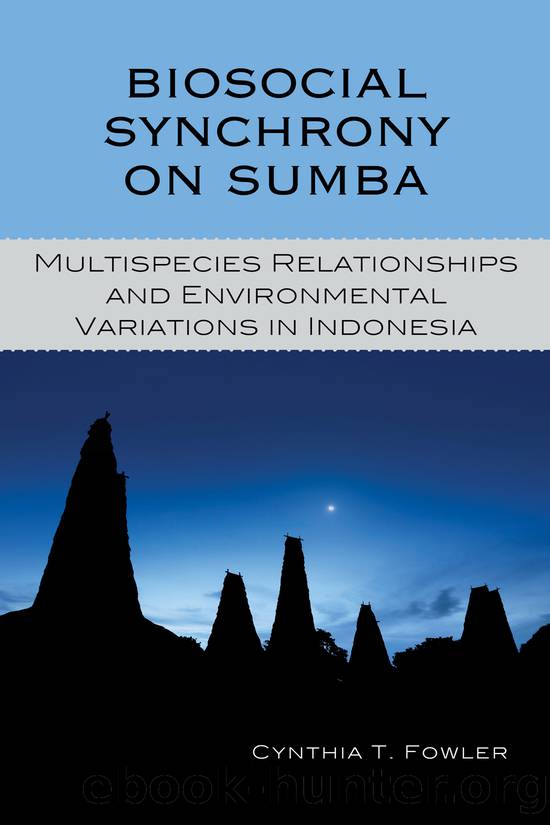Biosocial Synchrony on Sumba by Fowler Cynthia T.;

Author:Fowler, Cynthia T.;
Language: eng
Format: epub
Publisher: Lexington Books/Fortress Academic
Chapter 5
Listening for Cosmic Voices and Speculating about Their Perspectives
Kodi Peopleâs Entanglements with Astronomical Objects
What are the âparticular social formsâ (Descola 2013: 232) that Kodi culture projects onto the universe? This is a question about how humans make the biosocial worlds that extend beyond Earthâs boundaries, and to answer it this chapter takes on the task of assessing Kodi peopleâs knowledge about the objects in their sky and their practices related to cosmic bodies. Kodi people factor material information and symbolic meanings from the Moon and Sun into their conceptualizations of and practices in space-time.
Being Kodi, being human always involves co-belonging in the same universe as cosmic agents. The lives of Earthly humans and nonhumans are entangled with cosmic agents. While many astronomical objects are actors in Kodiâs biosocial worlds, the Moon and the Sun are especially active agents in the Kodi universe as indicated by their being the ones people most frequently evoke. Through thinking, expressing, and acting out their cosmology, Kodi share their world with these two especially prominent subjects/objects in the sky.
The question of whether the Moon, Sun, and other cosmic bodies are more accurately referred to as âobjectsâ or âsubjectsâ is tricky to answer because in Kodi cosmology the sky-beyond-Earth is inhabited by objects with âdispositions, motivations, and intentionsâ (Kohn 2007: 5). In possessing these qualities, the Moon and Sun are selves in a similar sense as seaworms are selves. Kodi people communicate information about the âdispositions, motivations, and intentionsâ (Kohn 2007: 5) of the Moon and Sun in various everyday and ritual contexts. In rituals, they chant the names of cosmic companions in rhythmic couplets, sing to them, play music for them, offer sacrifices to them, and divine their feelings while coaxing them into feeling and behaving in desirable ways. In everyday situations, Kodi people recount the histories of the Moon and Sun in myths and stories, and describe their own and their loved onesâ encounters with the cosmic actants.
The Moon and Sun have âtraditionalâ Kodi monikers as well as common everyday names. Wulla is the everyday name for the Moon. Lodâdo or Mata Lodâdo is the Sunâs common name. The traditional names of the Moon and Sun are spoken together in this lyrical couplet: Pati Ndera Wulla RaÅga Horo Lodâdo. This name identifies the Moon Sun as a complementary pair that includes a female side, Pati Ndera Wulla, and a male side, RaÅga Horo Lodâdo. Pati Ndera is an iconic name for Kodi people; usually women, but also some men. RaÅga Horo is an iconic name given to Kodi men. These human names were taken and given to the Moon and Sun, or vice versa. The Moon Sun is a double-gendered or transgendered subject. S/he belongs to the same taxonomic class as Mother Seaworm Father Fish (Inya Nale Bapa Ipu Mbaha), Mother Guardian of the Earth Father Guardian of the Rivers (Inya Mangu Tana Bapa Mangu Loko), and Great Mother Great Father (Inya Bokolo Bapa Bokolo). Members of this class occupy the top of the supernatural hierarchy.
Download
This site does not store any files on its server. We only index and link to content provided by other sites. Please contact the content providers to delete copyright contents if any and email us, we'll remove relevant links or contents immediately.
Cecilia; Or, Memoirs of an Heiress — Volume 1 by Fanny Burney(32548)
Cecilia; Or, Memoirs of an Heiress — Volume 2 by Fanny Burney(31947)
Cecilia; Or, Memoirs of an Heiress — Volume 3 by Fanny Burney(31932)
The Great Music City by Andrea Baker(31917)
We're Going to Need More Wine by Gabrielle Union(19035)
All the Missing Girls by Megan Miranda(15962)
Pimp by Iceberg Slim(14489)
Bombshells: Glamour Girls of a Lifetime by Sullivan Steve(14058)
For the Love of Europe by Rick Steves(13933)
Talking to Strangers by Malcolm Gladwell(13350)
Norse Mythology by Gaiman Neil(13349)
Fifty Shades Freed by E L James(13233)
Mindhunter: Inside the FBI's Elite Serial Crime Unit by John E. Douglas & Mark Olshaker(9324)
Crazy Rich Asians by Kevin Kwan(9280)
The Lost Art of Listening by Michael P. Nichols(7494)
Enlightenment Now: The Case for Reason, Science, Humanism, and Progress by Steven Pinker(7306)
The Four Agreements by Don Miguel Ruiz(6745)
Bad Blood by John Carreyrou(6611)
Weapons of Math Destruction by Cathy O'Neil(6267)
